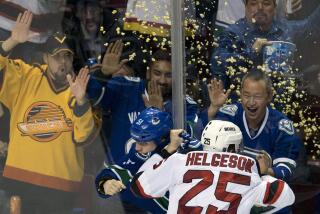The Wall the NHL Is Facing
- Share via
Returning from the oblivion of a lockout that wiped out the 2004-05 season, the NHL discovered that its fans -- and many of its sponsors -- were surprisingly forgiving.
Lured by an array of rule changes that invigorated the game, fans filled 91.7% of arenas’ seats and set an attendance record last season. Revenues hit a record $2.15 billion as sponsors pursued the league’s young, tech-savvy demographic.
“What has been demonstrated over the last year is that this game is fundamentally strong and fans are unbelievably terrific,” Commissioner Gary Bettman said. “For any business, let alone a sports league, to take a year off and come back and set an attendance record and earn record revenues, it says that there are great strengths in this game, not the least of which are our wonderful fans.”
With that as a springboard, the NHL should be thriving as it prepares to drop the puck today on the 2006-07 season.
It’s not.
The euphoria of its return has faded and its fundamental problems have resurfaced, reducing the league to marginal status.
The NHL is blessed with a game that’s breathtaking when seen in person, but cursed because the speed isn’t apparent on TV. Its players’ stoicism and team-first credo are refreshing in a landscape fouled by selfish whiners, but that selflessness makes players reluctant to stand out and become the marketable personalities the NHL so desperately needs.
The league has been unable to expand beyond its core fans and is stuck on a cable network, Versus, that’s unavailable in some NHL markets and rarely accessible in sports bars or hotels. Its ratings last season trailed college softball and poker. Only by adding 7 million homes -- including about 10,000 in the Los Angeles area -- has Versus’ scope hit 70 million, 20 million short of ESPN and ESPN2. Over-the-air coverage on NBC won’t start until January and will encompass merely nine weeks.
Fewer than half the newspapers in NHL markets sent a reporter to the Stanley Cup finals last spring and many plan to reduce coverage this season. The Internet’s immediacy makes it a more timely source than newspapers, but the NHL can’t afford to lose coverage in any medium.
“Anecdotally, I feel like there’s not a buzz about the sophomore season,” said Paul Swangard, managing director of the Warsaw Sports Marketing Center at the University of Oregon and avowed hockey enthusiast.
He praised the league’s economic stability and competitive balance but said many flaws remain.
“Their sport still doesn’t translate to television, and it’s hard to find. And I think the sport has really struggled to find cultural relevancy, and I know they’ve tried,” he said, citing advertising campaigns featuring Shania Twain, Jim Belushi and Keifer Sutherland. “The success of major pro leagues has been not only on the sports pages but on the entertainment page. It has to be seen as hip and relevant and part of the entertainment culture of the country....
“The model for success in professional sports has been rooted in the TV audience that has created economic wealth for the NFL and NBA, particularly,” Swangard said. “I think hockey is a seeing-is-believing sport. It’s a great night-out value proposition. That, for me, makes it harder to say this is going to be a sport that explodes. I think people who love the game are the people who have been going.”
The NHL’s marketing efforts haven’t helped draw converts.
Its main campaign last season cast actors as player/warriors; one ad featured a scantily clad woman preparing a man for battle, an appalling image during a time of real war. The sexism was surprising for a league that claims 41% of fans ages 12 and older who attend its games are women, a higher percentage than fans of the NFL, NBA or Major League Baseball.
This year, the theme will be “My NHL” and will focus on fans’ connection to the game. The key is to get fans to make a connection and maintain it, developing the loyalty that will sustain teams in nontraditional hockey cities during down cycles.
“The next step has to be to grow the base,” said Brian Burke, general manager of the Ducks and a former NHL executive. “When I was at the league office, we tried marketing the stars, which was the NBA’s philosophy. Then we started marketing teams. Whatever we do going forward, we have to think, ‘Let’s look after the fans who are already spending money.’ ”
And hope those fans return, with lots of friends.
“What’s difficult is, we need to get more casual sports fans involved,” Bettman said. “We need to grow our national ratings and we need to get more exposure for our game.”
The game’s character also has been a source of debate. Banishing obstruction led to more scoring and good flow, but some players and executives believe hockey’s trademark physical play all but disappeared.
“I think the physicality you’re used to, the wall work and things like that, has kind of been eliminated. A little bit, anyways,” Ducks defenseman Chris Pronger said. “I think it opens up the game, and you’re seeing a lot of power plays.”
Wayne Gretzky, coach of the Phoenix Coyotes, said the NHL “is finding that it’s such a fine line” to maintain a balance between scoring and hitting.
“One of the things that makes our game so great is the physical aspect,” he said. “And what I think they were trying to explain to us and the fans is they still want that physical part of the game to be a strong presence, but they wanted to eliminate the hooking, grabbing, clutching.
“For everyone, that makes it difficult. Because you can have such a tremendous, back-and-forth physical game and all of a sudden, because you might get physically tired or mentally tired, a guy might take his hand off the stick and grabs his guy and it’s a penalty and it disrupts the flow of the game.”
However, Gretzky said the officiating standard should not be relaxed.
“We’re trying to promote skill players and the finesse part of the game and we also understand the physical part and the defensive part is what wins championships,” he said. “So I like the game the way it is now. I think it’s only going to get better.”
Thursday: How the NHL can fix its faults.
Helene Elliott can be reached at helene.elliott@latimes.com. To read previous columns by Elliott, go to latimes.com/elliott.
*
Opening night
The NHL schedule for tonight, the opening of the 2006-07 season (all times PDT):
* Buffalo at Carolina, 4 p.m.
* Ottawa at Toronto, 4:30 p.m.
* Dallas at Colorado, 7 p.m.
Associated Press
More to Read
Go beyond the scoreboard
Get the latest on L.A.'s teams in the daily Sports Report newsletter.
You may occasionally receive promotional content from the Los Angeles Times.







